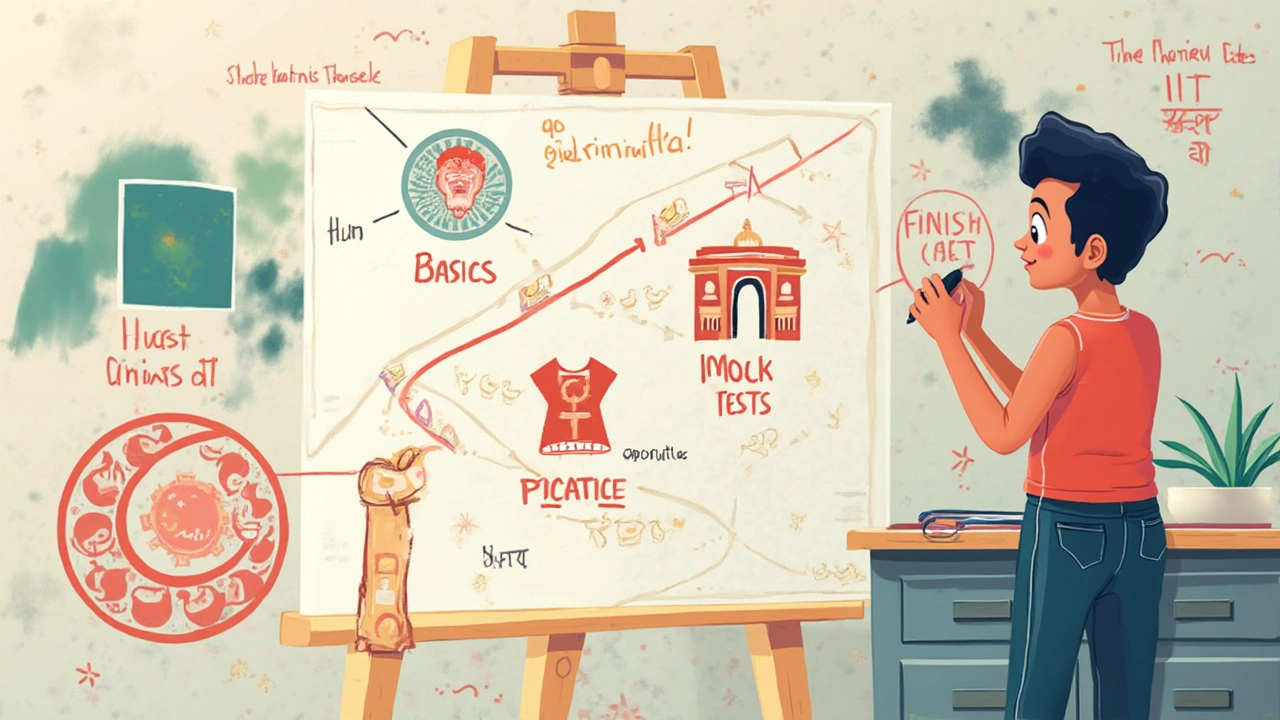The first thing you need to know about IIT prep? It’s not magic. You don’t need to be some crazy genius—just honest effort, a plan, and the ability to keep going even when it sucks. Most toppers didn’t solve calculus in the womb; they just started early and were super consistent.
The IIT JEE isn’t a normal school exam. It tests what you really know rather than what you’ve memorized overnight. And the questions? They can twist your brain in five different directions. Trying to cram isn’t going to get you far. You have to really understand the subjects—Physics, Chemistry, and Math. Get your basics right; trust me, most people mess up simple stuff when they panic in the exam hall.
If you’re starting from scratch, two things matter most: a solid plan (yours, not your friend’s) and a strong foundation in the basics. Don’t waste hours collecting every fancy book or chasing every YouTube 'strategy.' Pick standard books and start small. NCERT is still king for basics. Grab it, actually read it, and solve every example—no skipping.
- Understanding the IIT JEE Exam Landscape
- Crafting a Realistic Study Plan
- Getting the Right Resources
- Building Smart Study Habits
- Staying Sane and Motivated
Understanding the IIT JEE Exam Landscape
If you want to crack the IIT JEE preparation game, you need to know what you’re up against. The IIT Joint Entrance Examination (JEE) isn’t just another test—it’s the gateway to India’s most elite engineering colleges. The exam comes in two rounds: JEE Main and JEE Advanced. You have to clear Main first, and only then get a shot at Advanced. Each year, around a million students try their luck, but only about one percent land a seat in an IIT. The odds are wild, but not impossible if you get your act together early.
Let’s break down the structure. JEE Main covers Physics, Chemistry, and Math, with each subject getting 30 questions: 20 multiple choice and 10 numerical problems. Advanced is tougher, with odd question types like matching lists, multiple corrects, and even negative marking. So, guesswork can really mess you up if you’re not careful.
| Exam | Subjects | Question Types | Duration |
|---|---|---|---|
| JEE Main | Physics, Chemistry, Math | MCQ + Numeric | 3 hours |
| JEE Advanced | Physics, Chemistry, Math | MCQ, Numeric, Match the column | 6 hours (2 papers) |
What really messes with people is not the theory, but the way questions are framed. They’re designed to make you think, not just spit out memorized facts. This is why practicing application-based problems matters way more than rote learning.
Another thing nobody tells you: the competition isn’t just among friends in your class—it’s national. You’re not just aiming for some passing score, but for a rank that actually gets you into an IIT branch you like. For General category, you usually need to be in the top 10,000 ranks for any IIT seat, and way higher for popular streams like Computer Science.
Here’s what you need to remember about the beginner IIT tips everyone wishes they knew sooner:
- Understand the weightage: Some chapters appear more often in the exam, so check the latest trends before you start your revision.
- Exam pattern changes aren’t rare. Every year can bring something new, so keep an eye on the official JEE website for updates.
- Speed and accuracy matter as much as knowing the content. Time management is a skill you need as much as subject knowledge.
The IIT JEE isn’t about being a human calculator. It’s about smart prep, understanding concepts, and knowing how to play the exam’s game. Once you know this landscape, you’ll do a lot better at preparing—no surprises on the big day.
Crafting a Realistic Study Plan
If you want to crack the IIT JEE preparation, the first thing you need is a plan that actually fits your life. Don’t try to copy four-hour YouTube study routines if you’re already bogged down by school work, sports, or anything else. The smartest way? Start by figuring out how much free time you really have every week—be honest with yourself.
Now, break those hours down by subject, giving more time to your weaker areas. This isn’t just about pumping in hours—it’s about being consistent. Even 2-3 hours a day, but every day, beats pulling all-nighters only on weekends. The best toppers usually made their study plans around their own strengths and school schedule, not somebody else’s Instagram post.
Here’s a super simple template that works for most beginners:
- Finish school homework first, then pile on JEE prep—don’t ignore board exams.
- Pick 2-3 major topics per week (say, one from Physics, one from Chemistry, and one from Math).
- Set a small realistic goal for each topic: cover a chapter, solve 25 problems, or understand a tricky concept.
- End every week with a mini review session—just check if you actually understood what you studied or you just zoned out.
When it comes to time management, use a basic monthly or weekly calendar. Some people swear by Google Calendar, while others stick post-its on their wall—doesn’t matter as long as you see your plan every day. People who keep track of their progress using such planners tend to improve more quickly because they can spot and fix problems early on.
If you’re curious how toppers split their time on average, check this out:
| Subject | Average Daily Hours |
|---|---|
| Physics | 1.5 |
| Chemistry | 1 |
| Math | 1.5 |
Some days you’ll fall behind—it’s normal. Just pick up where you left off, don’t try to finish in a panic. Don’t forget to build in chill time. Burning out helps no one. And yes, regular healthy sleep is non-negotiable.

Getting the Right Resources
Picking your prep materials for IIT JEE preparation might sound simple, but there’s a lot of noise out there. People waste months hunting for the "secret book" or stashing up every PDF they see. Don’t do that. The actual toppers stick to reliable, standard stuff and use it well.
Your first stop is NCERT. For Chemistry, NCERT books literally set the paper’s questions, especially for Inorganic. In Physics and Math, the basics in NCERT are a must, but you’ll want to go deeper. Here’s what works for most aspirants:
- Physics: H.C. Verma is a classic. Concepts of Physics (both parts) build real understanding and the problems are worth your time. If you want more, D.C. Pandey’s series goes topic by topic, especially helpful if you get stuck.
- Chemistry: NCERT rocks for Inorganic and Organic basics. After that, O.P. Tandon can help you level up, and M.S. Chauhan is a favorite for Organic problem-solving. Physical Chemistry? N Avasthi is solid for practice.
- Mathematics: R.D. Sharma (for school basics), then crank it up with books like Cengage or Arihant series. For problem practice, M.L. Khanna’s old but gold. Go for quality problems, not just quantity.
Now, about coaching material and test series—if you’re joining a coaching, use their sheets and tests seriously instead of “saving them for later.” Most serious JEE study plans include mock tests from Allen, FIITJEE, or Resonance. These aren’t just practice; they let you see real exam patterns and fix silly goof-ups early.
Don’t forget online resources. Channels like Physics Galaxy or MathonGo actually explain concepts, not just throw quick tricks. But yeah, avoid the trap of binge-watching too many tutorials—watch, make notes, then solve problems yourself.
Check this quick comparison to keep your bookshelf lean, not overloaded:
| Subject | Must-have Book | Recommended Add-On |
|---|---|---|
| Physics | H.C. Verma | D.C. Pandey |
| Chemistry | NCERT | O.P. Tandon / M.S. Chauhan / N Avasthi |
| Math | R.D. Sharma | Cengage / Arihant / M.L. Khanna |
No fancy loot needed. Get the basics, use mock tests, and apply yourself. Choosing too many books is just a clever way of not studying. Lock down a few, milk them for all they’re worth, and you’re ahead of half the crowd already.
Building Smart Study Habits
If you want to crack the IIT JEE preparation code, sharp habits matter more than slogging for hours just staring at books. You’re not just competing with classmates—you’re up against students across India. So you need skills that let you actually remember things, spot patterns, and tackle weird new problems, not just routine ones.
First rule: study less, but study better. Break your study blocks into 45-50 minute sessions. Take short breaks—your brain, like your phone, needs to recharge. Science backs this up: the Pomodoro Technique boosts focus, and real toppers swear by it. Here’s what toppers like Nitin Jain, AIR 1 in JEE 2009, said:
"I used to study in bursts and take a 5-10 minute break after every hour, which kept me fresh and focused.”
No multi-tasking. Don’t pretend you’re 'revising' while scrolling Instagram or texting. Keep your phone out of the room if you can. Your brain works best when all it’s doing is one subject, one topic, one problem at a time.
Active learning helps much more than just reading. So after you finish a chapter:
- Make your own flashcards for formulas and reactions (works for Physics, Chemistry, even tricky Math stuff).
- Try solving different types of problems—from basic NCERT to JEE Advanced pattern.
- Explain topics out loud, even if it feels silly (your brain will remember better).
- Regularly write mini tests for yourself. Sunday = mock test day. Trust me, facing a timer at home is way less scary than in the real exam.
Consistency beats crazy-long study marathons. Set daily goals, not just big dreams. Even three focused hours can do more work than ten distracted ones. Here’s a simple example of a weekly study log that some real JEE aspirants use:
| Day | Subject 1 | Subject 2 | Test/Revision |
|---|---|---|---|
| Monday | Physics - Mechanics | Chemistry - Organic | Math revision |
| Tuesday | Math - Algebra | Physics - Optics | Chemistry revision |
| Wednesday | Chemistry - Physical | Math - Calculus | Physics revision |
Use this just as a template and change up topics based on your needs. The key is regular, spaced revision (don’t let topics pile up!).
Finally, track your mistakes. Every wrong answer is a goldmine. Keep a notebook of errors—when you review before the exam, fix those common silly slip-ups. That’s how most real rankers shave off easy marks lost to bad habits.
Build these habits and you’ll turn starting IIT prep into steady progress—no magic, just real practice.

Staying Sane and Motivated
This entire IIT JEE preparation journey is mentally tough. Seriously, even the best students hit days when nothing makes sense and motivation hits rock bottom. What keeps you going isn’t that magical “inspiration,” but routine, community, and some good old self-care. There’s a reason about 85% of JEE aspirants report serious stress or burnout at least once, according to last year’s Allen Institute survey.
Start with realistic goals. You can’t do advanced problems if you’re still shaky with basics. Break your plan into small parts—solve 20 problems a day, finish one topic per week. Cross things off as you go. Hitting these micro-goals actually releases dopamine (which makes you feel good and charged up to keep grinding).
No one survives this on willpower alone. Build a study routine that leaves space for breaks, meals, and sleep—yes, real sleep, not three-hour power naps. Students who slept at least 7 hours had better retention and concentration, research by the Indian Sleep Society found. Going zombie mode doesn’t make you a topper; it just makes you forget stuff.
- Stick to one solid schedule. Don’t keep shifting your study hours.
- Spend 10-15 minutes daily relaxing—walk, music, silly memes, whatever chills you out.
- Stay off toxic comparison. Block out the "X got 99%" talk. Focus on your own growth.
- Talk with parents, siblings, or friends if it gets too much. A rant session can do wonders.
- Reward yourself for milestones—maybe a special treat or an episode of your favorite show.
Mock tests can mess with your head. If you bomb a few, don’t spiral. Toppers also had silly scores at first. What matters is learning where you went wrong, not crying over one bad test day. After every mock, do a quick post-mortem:
- Identify silly mistakes and weak topics
- Plan how you’ll fix them this week—one step at a time
Here’s a quick look at what usually hurts and what actually helps:
| What Drains Motivation | What Actually Works |
|---|---|
| All-nighters | Consistent sleep |
| Comparing marks with others | Tracking personal progress |
| Ignoring breaks | Regular short breaks |
| Solo struggle | Talking with supportive people |
So next time you want to quit, remember why you started. Whether it's passion, better career options, or just proving it to yourself—hang on to that. Every JEE study plan will have rough patches. What matters is getting back up, not being perfect every day.










